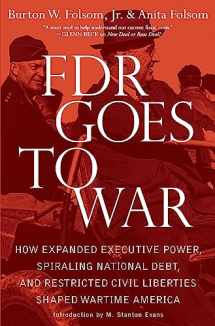
FDR Goes to War: How Expanded Executive Power, Spiraling National Debt, and Restricted Civil Liberties Shaped Wartime America
Book details
Summary
Description
From the acclaimed author of New Deal or Raw Deal?, called “eye-opening” by the National Review, comes a fascinating exposé of Franklin Delano Roosevelt’s destructive wartime legacy—and its adverse impact on America’s economic and foreign policies today.
Did World War II really end the Great Depression—or did President Franklin Roosevelt’s poor judgment and confused management leave Congress with a devastating fiscal mess after the final bomb was dropped? In this provocative new book, historians Burton W. Folsom, Jr., and Anita Folsom make a compelling case that FDR’s presidency led to evasive and self-serving wartime policies.
At a time when most Americans held isolationist sentiments—a backlash against the stunning carnage of World War I—Roosevelt secretly favored an aggressive interventionist foreign policy. Yet, throughout the 1930s, he spent lavishly on his disastrous New Deal programs and slashed defense spending, leaving America vastly unprepared for Japan’s attack on Pearl Harbor and the challenge of fighting World War II.
History books tell us the wartime economy was a boon, thanks to massive government spending. But the skyrocketing national debt, food rations, nonexistent luxuries, crippling taxes, labor strikes, and dangerous work of the time tell a different story—one that is hardly the stuff of recovery.
Instead, the war ushered in a new era of imperialism for the executive branch. Roosevelt seized private property, conducted illegal wiretaps, tried to silence domestic opposition, and interned 110,000 Japanese Americans. He set a dangerous precedent for entangling alliances in foreign affairs, including his remarkable courtship of Russian dictator Joseph Stalin, while millions of Americans showed the courage, perseverance, and fortitude to make the weapons and fight the war.
Was Roosevelt a great wartime leader, as historians almost unanimously assert? The Folsoms offer a thought-provoking revision of his controversial legacy. FDR Goes to War will make America take a second look at one of its most complicated presidents.


We would LOVE it if you could help us and other readers by reviewing the book
Book review



